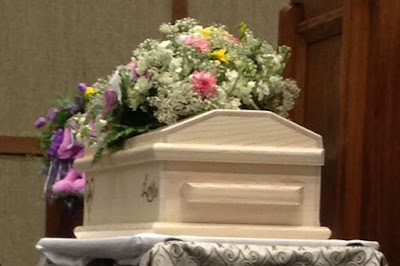Prominently
among those credited with the formation of the Pilgrim Church in 1605 is the
name Samuel Fuller, the brother of my 10th Great Grandfather, Thomas
Fuller.
It has been
said, “The Pilgrims were not remarkable men … but they did
possess fine qualities for the work which they were destined to accomplish,
remarkable energy, faith, purpose, courage and patience.” (“Women of the Mayflower” by
Annie Russell Marble)
These
admirable men were bound together by a common religious faith, but not common
social status, representing all the different classes of English life. Yet,
humbly they merged to form a community, each contributing to the good
of the whole. Samuel was the son of a butcher, and before he moved from England to Amsterdam with the Pilgrim
movement, had acquired sufficient education to practice medicine. Nevertheless, for
the good of the group, he also learned the practical trade of “say weaver”, or the
weaver of fine textured cloth (silk).

Samuel's life had not been easy. Prior to boarding the Mayflower, he had buried his first two
wives, Alice Glascock and Agnes Carpenter and had wed his third bride, Bridget
Lee. Bridget did not sail with him to America, staying behind with plans to
join her husband later, after a settlement was established. Samuel took with him a young servant, a
fatherless adolescent boy named William Butten, who was the only passenger to
die during the voyage itself, passing away three days before land was sighted.
At the conclusion of the crossing, in Cape Cod, on the 11th day of November, 1620, a platform of
government known as the Compact was
drawn on the lid of a chest on board the ship, and signed by forty-one of the
principal men.
Although the original document has not been found, transcriptions of the period record that Great Uncle Samuel was the 8th signer of The Mayflower
Compact, which read as follows (SIC):

"In
the name of God, amen. We,
whose names are underwritten, the Loyal Subjects of our dread Sovereign Lord
King James, by the Grace
of God, of Great Britain, France, and Ireland, King, Defender of the Faith, &c. Having
undertaken for the Glory of God, and Advancement of the Christian Faith, and
the Honour of our King and Country, a Voyage to plant the first Colony in the
northern Parts of Virginia;
Do by these Presents, solemnly and mutually, in the Presence of God and one
another, covenant and combine ourselves together into a civil Body Politick,
for our better Ordering and Preservation, and Furtherance of the Ends
aforesaid: And by Virtue hereof do enact, constitute, and frame, such just and
equal Laws, Ordinances, Acts, Constitutions, and Officers, from time to time,
as shall be thought most meet and convenient for the general Good of the
Colony; unto which we promise all due Submission and Obedience.

IN
WITNESS whereof
we have hereunto subscribed our names at Cape-Cod the eleventh of November, in the Reign of our
Sovereign Lord King James,
of England, France, and Ireland, the eighteenth, and of Scotland the fifty-fourth, Anno Domini, 1620."
The Mayflower finally set anchor in Plymouth Harbor in December, 1620. A year of extreme hardship and
sacrifice followed. With sickness rampant, Samuel served diligently as physician and surgeon. His skills were also offered to native Americans who were injured during skirmishes with the settlers.
Samuel also played a prominent role in the church congregation, serving as Deacon in the church in Plymouth, a role quite different from Deacon in the Church of Jesus Christ of Latter-day Saints today.
In early autumn of
1621, the 53 surviving Pilgrims celebrated their first successful harvest, as
was the English custom. That 1621
celebration is remembered as the "First Thanksgiving in Plymouth."
Great Uncle Samuel
is listed as one of the twenty-two men present.
As a deeply religious people, the Pilgrims undoubtedly prayed at the 1621 harvest feast.
Their prayers were spontaneous and the
exact words are not known. A typical prayer of gratitude of the period, as
recorded in 1625 gives us an idea of what this Thanksgiving prayer may have included
(SIC):
“O Lord our God and heavenly Father,
which of Thy unspeakable mercy towards us, hast provided meate and drinke for
the nourishment of our weake bodies. Grant us peace to use them reverently, as
from Thy hands, with thankful hearts: let Thy blessing rest upon these Thy good
creatures, to our comfort and sustentation: and grant we humbly beseech Thee,
good Lord, that as we doe hunger and thirst for this food of our bodies, so our
soules may earnestly long after the food of eternal life, through Jesus Christ,
our Lord and Saviour, Amen.”
Samuel died in 1633, one of at least ten who succumbed to a smallpox epidemic in Plymouth. This is recorded in the writings of William Bradford (SIC):
".... and in the end, after he had much
helped others, Samuel Fuller who was their surgeon and physician an had been a
great help and comfort unto them. As in
his faculty, so otherwise being a deacon of the church, a man godly and forward
to do good, being much missed after his death. And he and the rest of their brethren much lamented by them
and caused much sadness and mourning amongst them, which caused them to humble
themselves and seek the Lord; and towards winter it pleased the Lord the
sickness ceased."

























